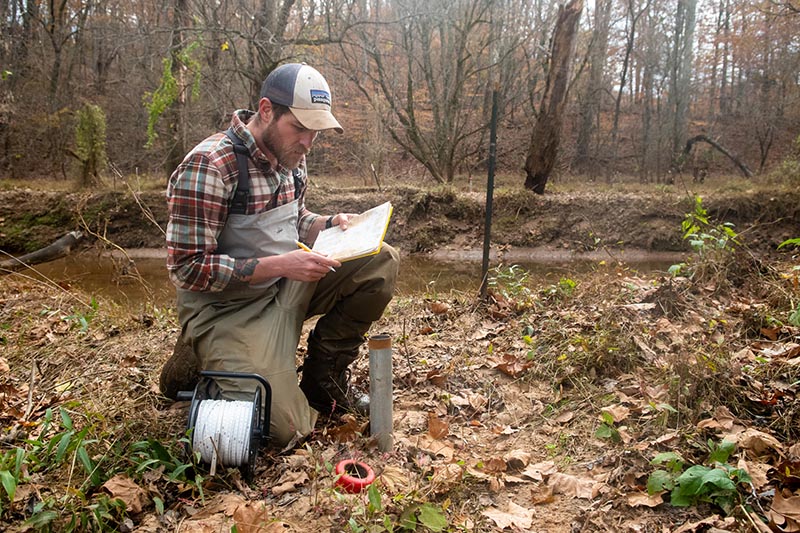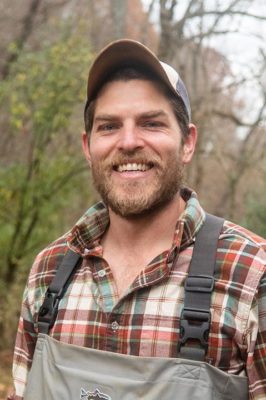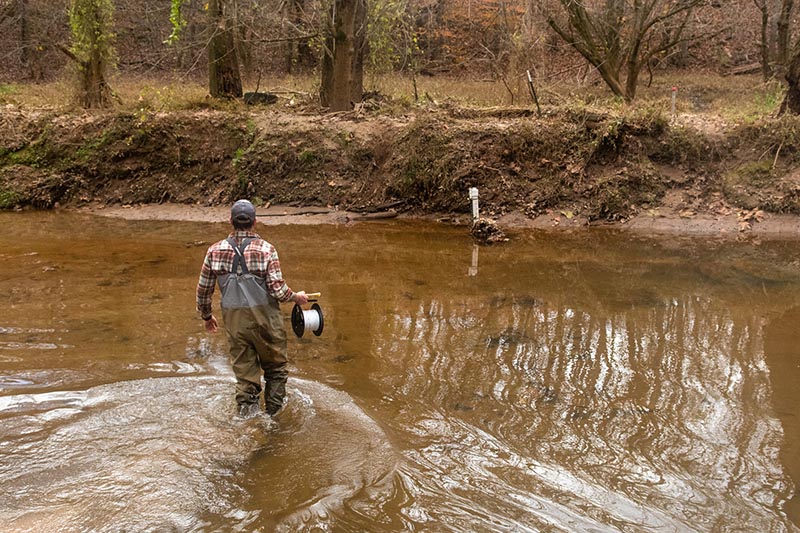
Environmental science major Benjamin Heskett’s hydrology research at College Lake earned him an unexpected Virginia Academy of Science Undergraduate Research Award earlier this month.
“When I reviewed the other projects, I thought I had no chance of winning,” Heskett, a senior from Lynchburg, admitted. “There were so many excellent projects. When the winners were nominated, and I heard my name, I started jumping around and dancing.
“My face hurt from smiling so much. I was so full of joy because this work was recognized as significant in the field I dearly love. I have committed my life to studying environmental science, so it was a great honor to have been recognized by the committee at Virginia Academy of Science.”
The award, announced at the 2020 Fall Undergraduate Meeting on Nov. 7, comes with a $500 research grant and free membership to the Virginia Academy of Science for 2021. Heskett plans to use the funds to purchase a key instrument that will allow him to develop a valuable groundwater hydrograph. He will present the results of his project, “Groundwater Monitoring & Analysis in Urban Wetlands,” at the 2021 Virtual VAS Annual Meeting in May.
 The project was inspired by Heskett’s interest in Blackwater Creek’s diverse ecosystem, its connection to College Lake, and the lake’s looming transformation since an August 2018 flood nearly broke the dam.
The project was inspired by Heskett’s interest in Blackwater Creek’s diverse ecosystem, its connection to College Lake, and the lake’s looming transformation since an August 2018 flood nearly broke the dam.
Over the past two years, the University of Lynchburg, the city, and AECOM have designed plans to remove College Lake Dam and convert the lake into a wetland ecosystem once construction of the new Lakeside Drive bridge and traffic circle are complete — sometime in 2022.
“It is necessary to develop a working understanding of the hydrology that maintains the ecological function of this system in order to steward this system well,” Heskett explained.
His project, in collaboration with environmental science and sustainability professor Dr. Laura Henry-Stone, studies the groundwater hydrology of the Blackwater Creek Wetlands. More specifically, it’s designed to “identify, monitor, and analyze the depth to the saturation zone within the study area’s palustrine forested wetlands, scrub-shrub wetlands, and Blackwater Creek’s floodplains.”
Over the past six months, Heskett and Henry-Stone, with help from the city and AECOM, have installed six shallow groundwater monitoring wells, observed fluctuations in the water table, and made some preliminary analyses in order to come up with a strategy for how best to simulate groundwater trends in the study area.
“The overarching question for the College Lake Dam Removal Project Team is how to do this sort of ecological restoration project well and serve as a model for other communities wrestling with similar urban watershed issues,” Henry-Stone said. “While the City of Lynchburg is taking the lead on designing the dam removal and stream restoration process, it really falls to the University to coordinate long-term research.
“Ben showed up at the right time with the right skill set and academic interests to contribute to this project. His groundwater project will not only help us establish some baseline data regarding hydrology in the areas identified for wetland restoration and/or creation, but will also serve as a template for the type of student-faculty research that can contribute to this project into the future.”
Future components include data that will aid AECOM in the wetland and stream design and help evaluate the success of the restoration project.
“Dam removals are becoming more and more common in the U.S., and there’s not a lot of research on dam removals in the nation, let alone within our particular physiographic province,” Heskett said. “So, having the ability to get in to observe this fluvial system years before the removal is truly a unique opportunity.
“Even cooler yet is that there will be significant stream and wetland restoration associated with the removal, which will improve the health of these downstream reaches of the Blackwater Creek Watershed. This project can be used by others in similar situations and add to the overall research effort to better understand dam removals and their impacts on the environment.”
 Heskett is grateful he’s had the opportunity to work with experts — specifically Dr. Robert Atkinson at Christopher Newport University; Erin Hawkins, who serves as water quality manager for City of Lynchburg’s Department of Water Resources and is the project manager for the College Lake Dam Removal Project; Catherine Lavagnino, AECOM’s primary wetlands specialist; and Brandon Alderman, AECOM’s senior stream restoration designer.
Heskett is grateful he’s had the opportunity to work with experts — specifically Dr. Robert Atkinson at Christopher Newport University; Erin Hawkins, who serves as water quality manager for City of Lynchburg’s Department of Water Resources and is the project manager for the College Lake Dam Removal Project; Catherine Lavagnino, AECOM’s primary wetlands specialist; and Brandon Alderman, AECOM’s senior stream restoration designer.
“This experience validates my dreams and ambitions in natural science,” Heskett said. “I feel invigorated and excited to continue on to graduate school, where I can continue my studies of watershed ecohydrology.”
His ultimate goal: to be a professor. “How neat would it be to end up teaching ecohydrology and restoration ecology here at the University of Lynchburg?” he said.
Another Lynchburg student, biomedical science major and Westover Honors Fellow Emma Strouse ’21, received an honorable mention at the VAS Annual Meeting for her project, “Analysis of the Effects of the Protein Survivin on Histone H3 in Metastatic Breast Cancer.”

